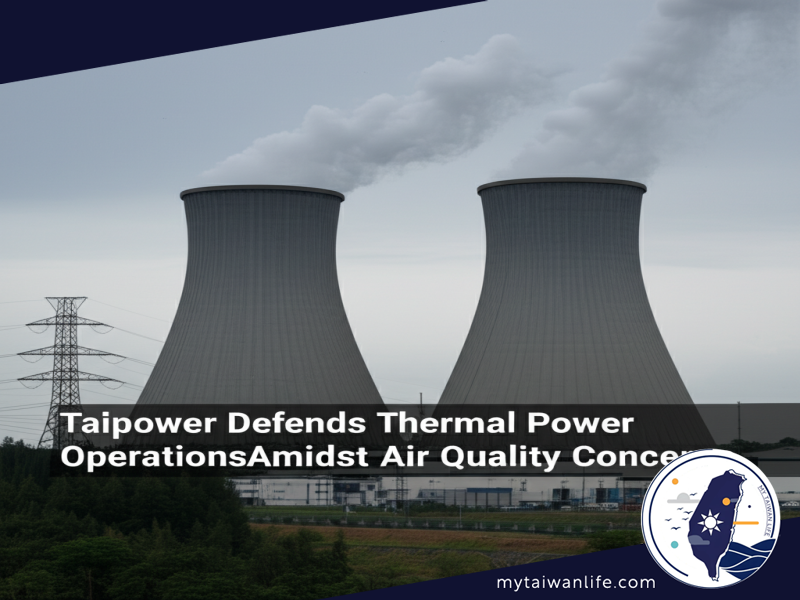Taipower Defends Thermal Power Operations Amidst Air Quality Concerns in Taiwan
Chair Tseng Wen-sheng Addresses Criticisms of Coal-Fired Plants and Highlights Pollution Reduction Efforts.

TAIPEI, Taiwan – Taipower Chair Tseng Wen-sheng (曾文生) has responded to growing public concerns regarding the operation of coal-fired power plants in Taichung and Kaohsiung, urging a balanced perspective on the company’s efforts to reduce pollution.
The criticisms come in the wake of the decommissioning of Taiwan’s final nuclear power unit. KMT Taichung Mayor Lu Shiow-yen (盧秀燕) has been a vocal critic of the Taichung Power Plant, which heavily relies on coal-fired generators. Her concerns have intensified following the nuclear shutdown.
Lu and the Taichung City Government have alleged increased output from the Taichung plant post-decommissioning. However, Taipower has stated that the differing figures cited by the city involved a mix of daytime and nighttime data.
In Kaohsiung, KMT City Councilor Chiu Yu-hsuan (邱于軒) pointed out the operation of the No. 3 and No. 4 coal-fired units at the Hsinta Thermal Power Plant, despite their permits expiring in September 2024.
Tseng stated that the Taichung plant, which comprises 10 coal-fired units, has not operated at full capacity for the past six years. He highlighted a 33% reduction in coal usage from its peak and an 80% reduction in air pollution, attributing the improvements to decreased coal consumption and the implementation of pollution control mechanisms. Tseng acknowledged public concerns about air quality and called for recognizing Taipower’s operational advancements.
Addressing concerns about increased nighttime output, Tseng explained that while solar power supplements thermal power during the day, the latter's output must increase at night.
Regarding the Hsinta plant, Tseng confirmed the scheduled decommissioning of the No. 3 unit by the end of 2025 and the No. 4 unit by the end of 2026. However, he clarified that these units might be activated if Taiwan’s operating reserve drops below 8%.
Taipower Vice President Tsai Chih-meng (蔡志孟) attributed the recent activation of the Hsinta units to a malfunction at the Ho-Ping Thermal Power Plant. According to the Kaohsiung Environmental Protection Bureau, these units now serve as backup and are only authorized to operate during power reserve shortages between the second and third quarters of 2024.
Other Versions
Taipower defiende las centrales térmicas ante la preocupación por la calidad del aire en Taiwán
Taipower défend ses activités de production d'énergie thermique dans un contexte d'inquiétude concernant la qualité de l'air à Taïwan
Taipower Mempertahankan Operasi Tenaga Panas Bumi di Tengah Kekhawatiran Kualitas Udara di Taiwan
Taipower difende le operazioni termiche tra le preoccupazioni per la qualità dell'aria a Taiwan
台湾の大気汚染が懸念される中、タイパワーが火力発電事業を擁護
타이완의 대기질 우려 속에서도 화력 발전 운영을 방어하는 타이파워
Ipinagtatanggol ng Taipower ang Operasyon ng Thermal Power sa Gitna ng Pag-aalala sa Kalidad ng Hangin sa Taiwan
Taipower защищает работу тепловых электростанций на фоне опасений по поводу качества воздуха на Тайване
ไต้หวัน พาวเวอร์ ปกป้องการดำเนินงานโรงไฟฟ้าพลังความร้อน ท่ามกลางข้อกังวลด้านคุณภาพอากาศในไต้หวัน
Taipower bảo vệ hoạt động của nhà máy nhiệt điện trong bối cảnh lo ngại về chất lượng không khí ở Đài Loan

